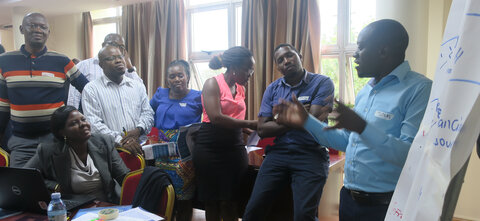Strengthening district management in Uganda – the road to UHC
By Dr Joanna Raven
Universal Health Coverage (UHC) cannot be achieved without strong local or district health systems (Meessena and Malanda 2014). However, few managers at these levels have had proper preparation for their important roles; clinical staff are frequently requested to assume managerial positions based on level of seniority (Daire, Gilson et al. 2014).
One of their key roles is to manage the health workforce, which includes making sure that they have enough staff, who are in the facilities providing services, and are equipped with the necessary competencies, resources and support to do their work. These managers are well positioned to take a system-wide approach to improving the performance of their health system and frontline health workers. They are close to the problems and know what they can achieve with their available resources.
PERFORM2Scale in Uganda

Uganda is slowly but surely moving toward achieving UHC, but with a current UHC service coverage index score of 45 out of 100 (see WHO, 2019), they have some way to go. Since 2018, the PERFORM2Scale programme has been working with district health management teams (DHMTs) in six districts in Uganda using a Management Strengthening Intervention (MSI).
This MSI uses an action research approach to enable the DHMTs to:
• analyse their own workforce performance and service delivery problems,
• develop appropriate workplans,
• implement the workplans and
• learn about management from the experience.
Addressing absenteeism in Uganda’s health districts

During the last two days, three districts have come together at an inter-district meeting in Kampala to share their experiences, learning, successes and challenges. Over the last 12 months, they have each been trying to address the challenging issue of health worker absenteeism in their districts, recognising that without health workers being in facilities to provide services it will be impossible to achieve UHC.
They have each adopted different strategies such as:
• meeting health facility managers to discuss the standing orders (regulations) on health worker attendance,
• dissemination of these standing orders to health workers,
• monitoring staff attendance through iHRIS (the computerised human resources information system used across Uganda) and mTrac (an SMS-based system which reports on disease surveillance, medicine tracking and community complaints about health worker attendance),
• using the Health Unit Management Committees to monitor and promote attendance,
• using arrival books, duty rosters, performance appraisals and improvement plans to monitor and report attendance,
• and rewarding staff who have excellent attendance records at the annual sector-wide district award ceremony.
These strategies have been successful in decreasing absenteeism. In one district, absenteeism has been reduced from 36% (before implementation of the strategies) to 19% today. In another district, the number of facilities receiving complaints about absent health workers reduced from 54% to 16%.
As one DHMT member said:
“Organised absenteeism has died out - health workers used to share their duties so that one health worker is on duty whilst the others are doing other work.”
The DHMTs acknowledge that this is a challenging issue but that they need to continue to work on it. One member said:
“At the start we were scared about addressing absenteeism as it is amorphous, reasons can be out of our control, not within our decision space, but we are very determined, we are now not scared, we are continuing to move.”
Rewarding staff for good performance was seen as an important way of motivating and supporting staff to continue to be committed to provide good quality services. It may not be possible to provide financial rewards, promotion or further education, but openly recognising good performance can work. As one DHMT explained:
“We’ve expanded our staff performance awards this year because of PERFORM2Scale - we’ve selected many more people.”
Strengthening management at the district level so that health workers are available, motivated, resourced and supported to provide quality and equitable services is critical. Without this, it will be difficult to achieve UHC.
There's more on universal health coverage on the WHO website.